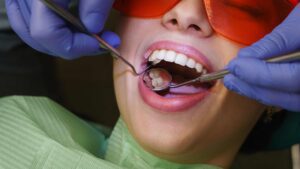Introduction
Your child’s smile is one of their most endearing features, and ensuring it stays healthy starts early. Many parents often wonder, “When should I schedule my child’s first dental visit?” The answer might surprise you. Early dental care is crucial not only for maintaining those adorable baby teeth but also for fostering a lifetime of good oral health habits. This comprehensive guide will walk you through everything you need to know about your child’s first dental visit, why it matters, and how to prepare for it.
For expert care, visit My Gentle Dentist and ensure your child’s smile is in good hands.
1. When Should Your Child First Visit the Dentist?

The general recommendation by pediatric dental associations is to schedule your child’s first dental visit within six months after their first tooth erupts or by their first birthday, whichever comes first. Here’s why:
- Early Detection of Issues: Dental problems like cavities can occur as soon as the first tooth appears. Early visits allow dentists to identify and address these issues promptly.
- Oral Hygiene Education: Parents can learn how to clean their child’s teeth properly and understand the importance of early oral care.
Key Milestones to Remember:
- First Tooth, First Visit: Book your appointment as soon as the first tooth erupts.
- Every Six Months: After the initial visit, schedule checkups every six months to maintain optimal oral health.
Searching for a trusted child’s dentist near me? Visit My Gentle Dentist for expert care.
2. Why Early Visits to the Dentist Matter

Preventive Care Starts Early
Cavities in baby teeth, also known as early childhood caries, are surprisingly common. Regular visits to a Kids Dental specialist can prevent these issues from escalating.
- Promotes Healthy Development: Baby teeth play a vital role in speech development and maintaining space for permanent teeth.
- Avoids Pain and Discomfort: Addressing dental issues early can prevent pain and the need for extensive treatments later.
Building a Comfort Level with the Dentist
Starting dental visits early helps your child become familiar with the dentist and reduces anxiety. A child who grows up with positive dental experiences is more likely to continue good oral health habits into adulthood.
3. What to Expect During Your Child’s First Dental Visit
A Gentle Introduction
The first visit is usually short and involves minimal treatment. The primary goal is to make your child comfortable and assess their oral health. Here’s what typically happens:
- Visual Examination: The dentist will check your child’s teeth, gums, jaw, and bite.
- Oral Hygiene Guidance: Learn about brushing techniques, teething care, and the role of fluoride in dental health.
- Discussion on Habits: The dentist will provide advice on thumb-sucking, pacifier use, and dietary habits.
Questions You Can Ask During the Visit
- How can I clean my baby’s teeth effectively?
- What should I do if my child resists brushing?
- Is fluoride toothpaste safe for my baby?
For a trusted Kids Dental specialist, explore the services at My Gentle Dentist.
4. Tips for Preparing Your Child for the Dentist
Make It a Positive Experience
- Talk Positively About the Dentist: Avoid using words like “hurt” or “needle.” Instead, explain that the dentist is a friendly doctor for their teeth.
- Practice a Pretend Visit: Role-play a dental checkup at home to familiarize your child with what to expect.
Choose the Right Dentist
- Search for a child’s dentist near me who specializes in pediatric care.
- Ensure the dental office is child-friendly, with a welcoming atmosphere and staff trained in handling children.
Plan Wisely
- Schedule appointments during a time when your child is well-rested and likely to be cooperative.
- Bring along a favorite toy or comfort item to ease their nerves.
5. The Role of Ongoing Dental Care
Regular Checkups are Essential
After the first visit, schedule routine checkups every six months. Regular visits ensure early detection of issues and reinforce good oral health habits.
Building Healthy Habits at Home
- Brushing: Encourage brushing twice a day with fluoride toothpaste.
- Flossing: Introduce flossing once two teeth touch.
- Dietary Choices: Promote water and limit sugary drinks.
Looking for expert guidance? Visit My Gentle Dentist for tailored advice on your child’s dental care.
6. Overcoming Common Challenges

Fear of the Dentist
- Practice patience and reassurance.
- Reward your child with praise or small treats after the visit.
Resistance to Brushing
- Make brushing fun with songs, stories, or colorful toothbrushes.
- Set a good example by brushing your teeth alongside your child.
Teething Troubles
- Use teething rings or a chilled cloth to soothe sore gums.
- Consult your dentist for additional relief options.
7. Why Choose My Gentle Dentist for Your Child’s Dental Care?
Specialized Pediatric Care
Our team at My Gentle Dentist is experienced in making dental visits a positive experience for children of all ages.
Comprehensive Services
From preventive care to treatment of dental issues, we provide tailored solutions for your child’s needs.
Convenient Location
If you’re searching for a child’s dentist near me, look no further. Our clinic is designed to cater to families with young children.
Conclusion
From baby teeth to big smiles, starting dental care early sets your child up for a lifetime of healthy teeth and gums. Whether you’re preparing for your child’s first dental visit or looking for tips on ongoing care, early intervention is the key to success.
Visit My Gentle Dentist today to schedule your child’s first appointment and take the first step toward a brighter smile.
Common Questions Parents Have About Kids Dental Care
When should I take my child to the dentist for the first time?
It is recommended to take your child for their first dental appointment by their first birthday or when their first tooth appears, whichever comes first.
What can I do to help my child prepare for their first trip to the dentist?
To help your child prepare for the dentist, you can read books about dental visits, play pretend dentist at home, and explain the process in a positive way to ease their anxiety.
What are the child dental benefits schedule for regular check-ups?
The child dental benefits schedule typically includes coverage for regular dental check-ups, preventive services, and sometimes basic dental treatment, depending on your insurance plan.
How often should my child see a dentist after their first visit?
After the first trip to the dentist, it is generally recommended that children see a dentist every six months for regular dental check-ups to maintain their oral health.
What should I expect during my child’s first visit to the dentist?
A: During your child’s first visit, the dentist will perform a gentle examination of their teeth and gums, provide advice on oral hygiene, and may clean their teeth to remove any plaque or buildup.
What if my child isn’t cooperative at their first dental appointment?
If your child isn’t cooperative during their first dental appointment, it’s important to remain calm and supportive. The dentist is trained to handle such situations and may suggest techniques to ease your child’s fears.
How can I ensure my child’s oral health between dental visits?
To ensure your child’s oral health, encourage them to brush their teeth twice daily with fluoride toothpaste, limit sugary snacks and drinks, and establish a routine dental care practice at home.
What are the signs that indicate I should take my child to the dentist sooner?
Signs that you should take your child to the dentist sooner include tooth pain, visible cavities, bleeding gums, or if your child is experiencing difficulty eating or talking.
Is it necessary for toddlers to have dental treatment?
Yes, if a toddler has cavities or other dental issues, dental treatment may be necessary to prevent further problems and ensure their smile remains healthy and bright.
How can I make my child’s first dental appointment a positive experience?
To make your child’s first dental appointment a positive experience, choose a pediatric dentist who specializes in treating children, keep a cheerful attitude, and offer praise and small rewards after the visit.




